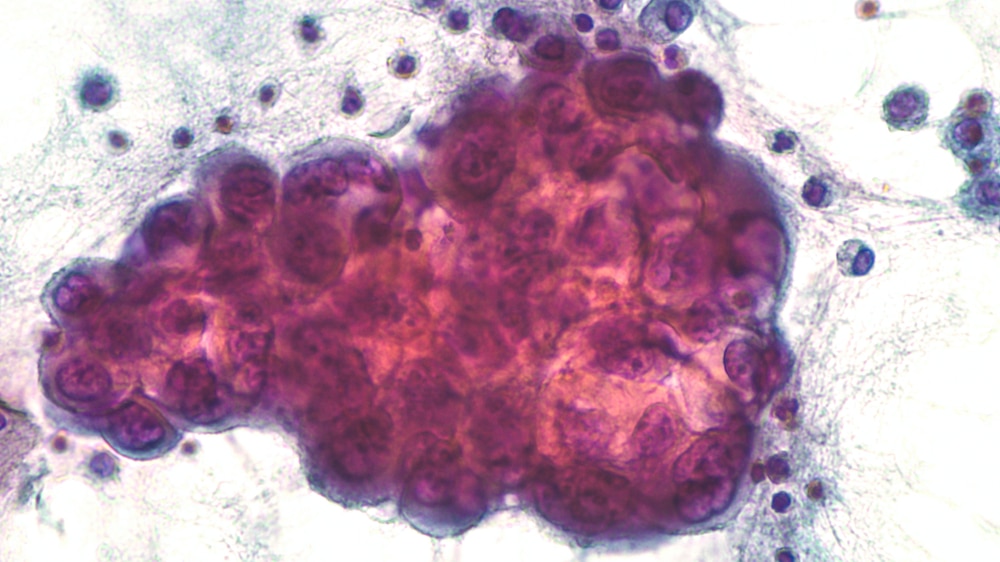Newsletter Signup - Under Article / In Page
"*" indicates required fields
Lyvgen Biopharma announced yesterday that it has started a phase 2 trial of LVGN7409 plus docetaxel or, in collaboration with Bristol Myers Squibb, nivolumab in patients with advanced/metastatic non-small cell lung cancer (NSCLC).
“Lyvgen clinical collaboration with Bristol Myers Squibb underscores our commitment to exploring combination regimens from our portfolio with complementary mechanisms of action that may transform cancer care”, said Jieyi Wang, founder and CEO of Lyvgen.
“We are excited to enter this clinical collaboration with Bristol Myers Squibb and look forward to initiating enrollment in these combination regimens for patients who cannot benefit from existing therapy worldwide.”
Lyvgen clinical collaboration
LVGN7409, a recombinant monoclonal antibody that targets CD40 for activation optimally in tumor microenvironment, which is a member of the tumor necrosis factor (TNF) receptor family (TNFRSF5) and modulates immune responses by activating antigen presenting cells and reprograming the immuno-suppressive tumor microenvironment.
Cluster of differentiation (CD) 40, CD40 is a costimulatory protein found on antigen-presenting cells and is required for their activation.
Bristol Myers Squibb’s nivolumab is a human monoclonal antibody that binds to the PD-1 and blocks its interaction with PD-L1 and PD-L2, releasing PD-1 pathway-mediated inhibition of the immune response, including the anti-tumor immune response.
Chemotherapy agent treating a number of cancers
Docetaxel is an anti-tubulin chemotherapy agent used to treat a number of types of cancer, including non-small-cell lung cancer, breast cancer, head and neck cancer, stomach cancer, and prostate cancer.
“Lyvgen believes that the combination therapy targeting co-stimulatory checkpoint CD40 and co-inhibitory checkpoint PD-1, may offer the greatest chance to increase immunotherapy effectiveness in patients with resistant or refractory diseases, further validating the synergy observed in our pre-clinical studies for the combination of LVGN7409 and an immune check-point inhibitors,” said Hubert Chan, chief medical officer.
“We also believe LVGN7409 may be useful in combination with immune-modulating chemotherapy agents such as docetaxel. Through this phase 2 study, we are enthusiastic to demonstrate that the stimulation of CD40 has the potential to reverse an immune-suppressed tumor microenvironment characterized by drug resistance and to improve anti-tumor efficacy when added to the current ‘standard of care’ therapy. There is a significant unmet medical need for the refractory NSCLC patients, and we hope this study will bring promising results to those cancer patients,” continued Chan.
Lyvgen: benefits for patients must be proven
Lygen said that clinical benefits for patients must be proven through rigorous clinical studies. There are no shortcuts. Lyvgen’s focus on immune agonists is widely applicable for most cancer indications. Our xLinkAb platform helps achieve a balance between safety and efficacy, which can greatly increase the chances of success. The advantages of agonistic antibodies have been validated in several preclinical and clinical studies.
At present, the company says the agonistic antibody field is still young, but developing rapidly with huge potential as a hot field of cancer immunotherapy. Our strength and long-term engagement in immune-oncology agonistic antibodies are returning primary promising clinical results. The Lyvgen pipeline of biologics may be benefit-cost effective drugs for a large panel of cancer indications.
Under the terms of the agreement, Lyvgen will sponsor the study and Bristol Myers Squibb will provide nivolumab for the combination trial. Lyvgen has global commercial and development rights to LVGN7409.
Oncology R&D trends and breakthrough innovations







